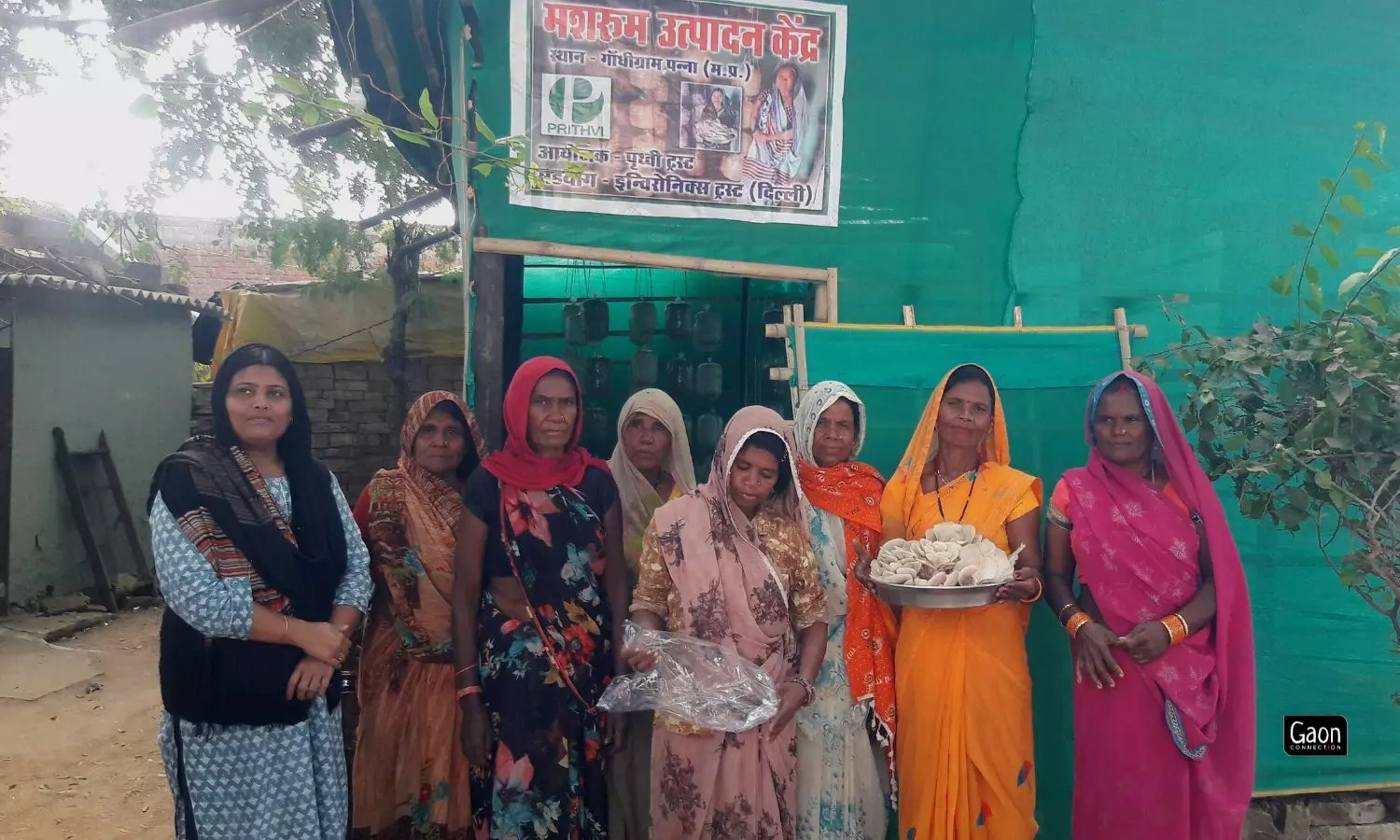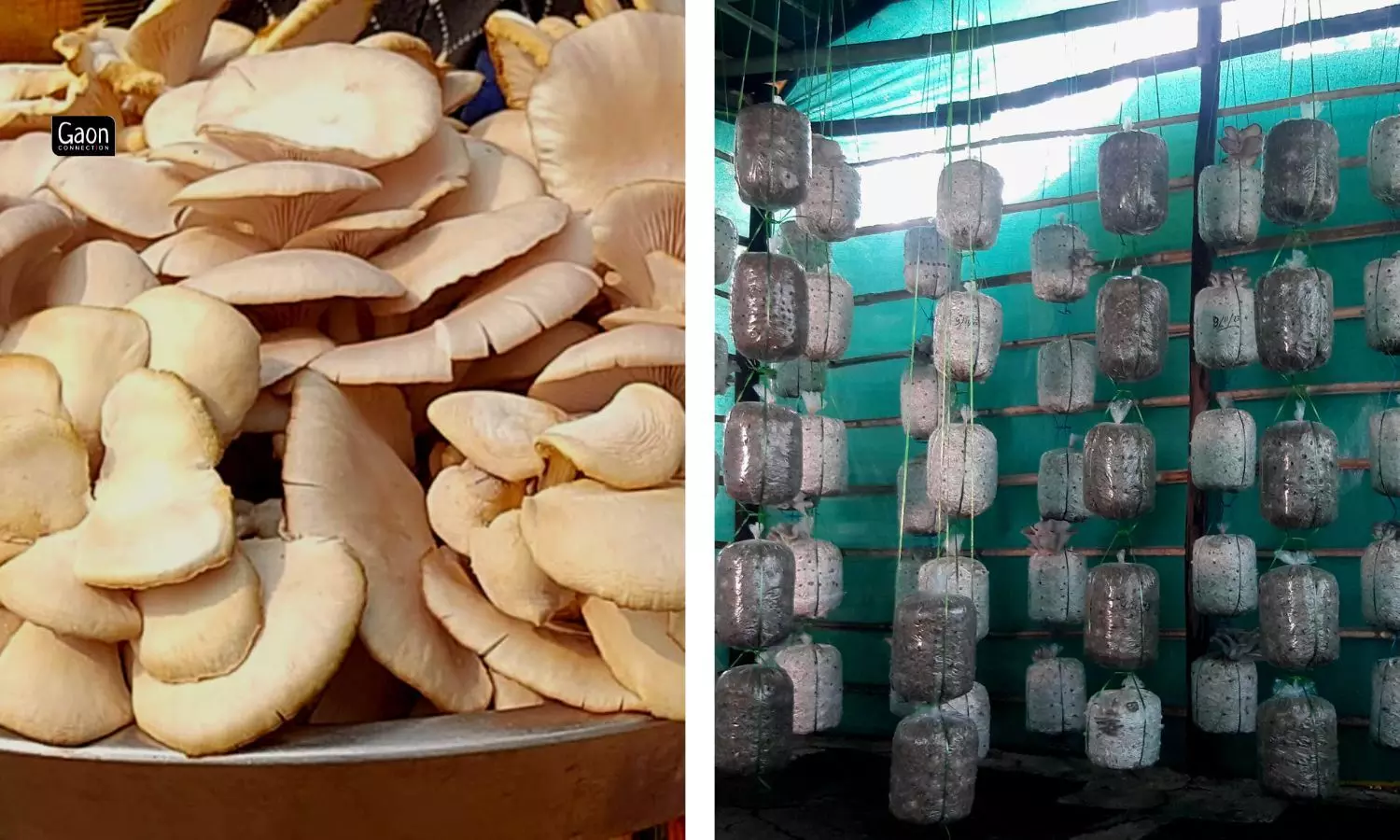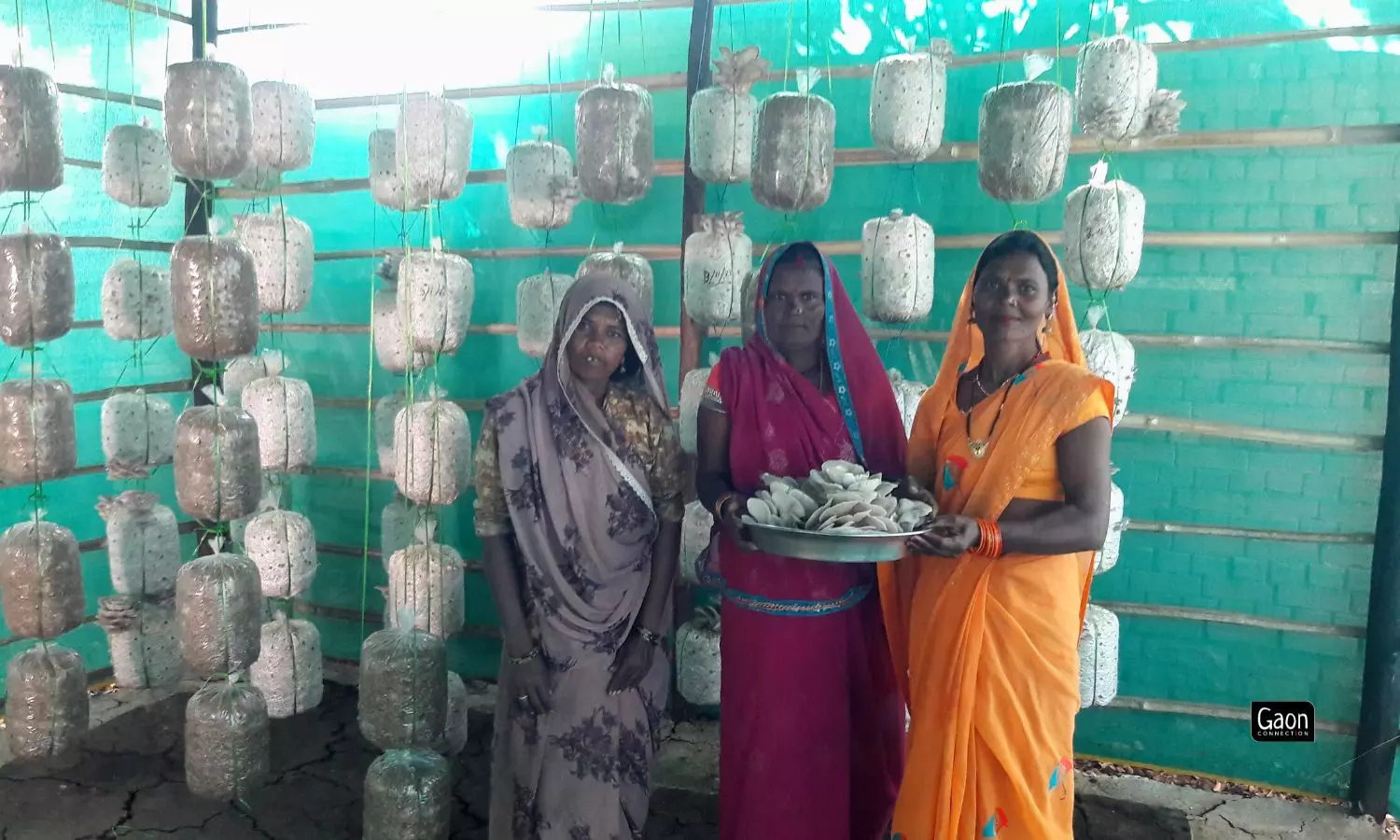Panna, Madhya Pradesh
Tirasiya Bai had resigned herself to a dreary and dark existence. All she had for sustenance was Rs 600 a month that she received as a disability pension from the government, as she is disabled, and walks with difficulty.
“My husband Imratlal Adivasi died two years ago. My father-in-law died too. Both due to silicosis disease. I have two sons and a daughter,” Tirasiya Bai who belongs to the Gond community, from Gandhi Gram village, in Panna, Madhya Pradesh, told Gaon Connection. The village is located about seven kilometres from the district headquarters.
Her older son is a daily wage labourer, who works in a mine (her husband got silicosis due to working as a mine labourer), while her younger son takes tuitions in the village, she said. “I had been totally dependent on my sons for my survival,” she said.
But now, the 36-year-old is involved in mushroom cultivation, which is not only keeping her gainfully employed but also providing her some money for sustenance.

These women come from families who have lost their members to silicosis and are now cultivating oyster mushrooms as a source of livelihood.
Earlier this year, a mushroom-cultivation centre was set up on a small patch of land in her village, which has brought a ray of hope in her life and that of several other women, who are getting trained in mushroom cultivation there.
These women come from families who have lost their members to silicosis, a debilitating lung disease caused due to inhalation of crystalline silica (found in stones, rocks, etc) dust. Panna is famous for its diamond mines and stone quarrying.
Also Read: Stoned to death: Tribal labourers in Panna’s stone mines continue to die of silicosis
“Ever since the mushroom-cultivation centre was set up, I have had something to look forward to,” said Tirasiya Bai.
She is growing 70 bags of oyster mushrooms at the centre itself. Plus, she said, she and her family get to eat the mushrooms too.
It’s the weekend but adivasi women are busy working as they harvest mushrooms that they have grown after receiving a training in mushroom cultivation. They are all landless and mushroom farming is the only source of their income.
: Panna, MP
: @Arun__Singh_ pic.twitter.com/Ly6MADxdf1— Gaon Connection English (@GaonConnectionE) December 9, 2023
The centre, set up by non-profit Prithvi Trust, has also become an active space to train local tribal women in mushroom cultivation.
Samina Baig from Prithvi Trust said that while the trust has been training women since 2021, a brick and mortar training centre was set up in Gandhi Gram this year and since October, three groups of 12 women each have undergone training and gone on to start mushroom cultivation in their respective villages and homes.
Training Tribal Women in Mushroom Cultivation
Women from the adivasi-dominated villages of Gandhi Gram, Ranipur, Sunahra, Jardhova and Majha in Panna district have been getting trained since 2021 by Prithvi Trust to cultivate oyster mushrooms and sell them for a living.
A number of these women, like Tirasiya Bai, come from families who have lost their breadwinners to silicosis.
“With some financial help from Delhi-based Environics Trust, we began the process of cultivating mushrooms and training women in it at Gandhi Gram in 2021,” said Samina Baig.

“In the local markets the mushrooms sell up to Rs 250 a kg. Marketing them still continues to be a challenge,” Baig said.
“We surveyed the five villages of Gandhi Gram, Ranipur, Sunahra, Jardhova and Maja, and chose women who came from families of silicosis victims who worked in the mines and stone quarries, and trained them in mushroom cultivation,” explained Baig.
The reasons for this were many, she pointed out. It was to improve the nutrition of the poor Adivasi women, prevent migration in their families, and provide them with a steady and secure means of livelihood.
Also Read: The sparkle of Panna’s diamond hides its underbelly of illegal mines and impoverished workers
Baig said that the project had met with considerable success. The adivasi women were taking interest in mushroom cultivation and were excited about earning money through it.
In the past year alone, 15 families belonging to the Adivasi community in Ranipur village have taken to mushroom cultivation. In one mushroom season, which is from October to March, each family earns up to Rs 5,000.
“After we gave them extensive training, we have also provided the women with everything that is needed for mushroom cultivation including the seeds, polythene bags and hay. We procure the oyster mushroom seeds from the Krishi Vigyan Kendra in Majhgaon in Satna at Rs 150 a kg,” Baig said.
Cultivation Mushrooms in Bags
Baig explained the method of cultivating oyster mushrooms. The first requirement is an enclosed space. If a room with walls is not an option, then the mushrooms can also be grown in tented, plastic or thatched enclosures.
It is important to ensure the openings to the space have mesh doors and windows so that there is enough natural light and ventilation.
The hay that goes into the polythene bags first needs to be fresh and clean and treated to get rid of any insects and other impurities. The plastic bag is layered with damp hay, of up to a kg in quantity and about 100 gms of seed are placed in it. Three or four layers are prepared this way.
Ten or fifteen holes of five or six millimetre (mm) dimension are punched on the sides of the bags, and the bags are then hung up. The mushrooms are ready between 20 and 25 days.
There are three harvests from the same bag, and each family makes Rs 5,000 per season of mushrooms, Baig said.
Also Read: Bihar: Farmers in Gaya see mushrooming profits
For Somvati Adivasi, mushroom cultivation has lightened her burden immensely, she said. “We do not need much space to grow mushrooms, and we can grow them at home. This is a big reason why we are so excited about this,” the 36-year-old resident of Ranipur village, told Gaon Connection.
It is so different from working in the stone quarries, she said. Somvati Adivasi now teaches other women on how to grow mushrooms.
“I took about 80 bags which yielded 80 kgs of mushrooms. Each bag has layers of hay and seeds and begins to yield in about 21 days. I can harvest the mushrooms thrice from each bag,” she said.
At the moment, whatever mushrooms the women grow, they sell them locally. If anything is left over, they use it for their own consumption.

Women from the adivasi-dominated villages in Panna district have been getting trained since 2021 by Prithvi Trust to cultivate oyster mushrooms and sell them for a living.
In the local markets the mushrooms sell up to Rs 250 a kg, Baig said. Marketing them still continues to be a challenge, she admitted.
“Since 2021, Prithvi Trust has trained 129 women from all five villages,” said Baig. They are now cultivating and selling mushrooms, as well as training other women.
Indrabhan Singh Bundela, regional coordinator of Lost Wilderness Foundation, a non-profit that works with tribal communities in and around the Panna Tiger Reserve, said that such livelihood projects are the need of the hour.
“Most of the Adivasi communities do not have any other source of livelihood other than working in the mines and quarries of Panna. Many of the stone quarries and mines where they worked once, have closed down too. Many men migrate to find work elsewhere,” said Bundela, whose organisation is helping employ youth from the Pardhi denotified tribe as tourist guides at the Panna Tiger Reserve.
“In such circumstances, providing training to the Adivasi women in mushroom cultivation is a good move. It provides them with much needed monetary help and at the same time the nutrition of their families is taken care of,” he added.


















